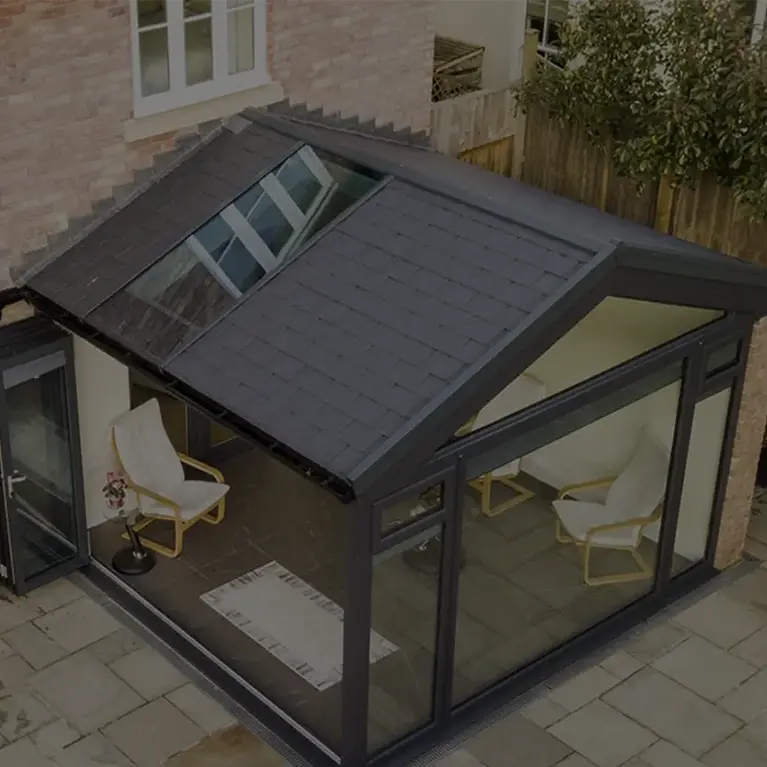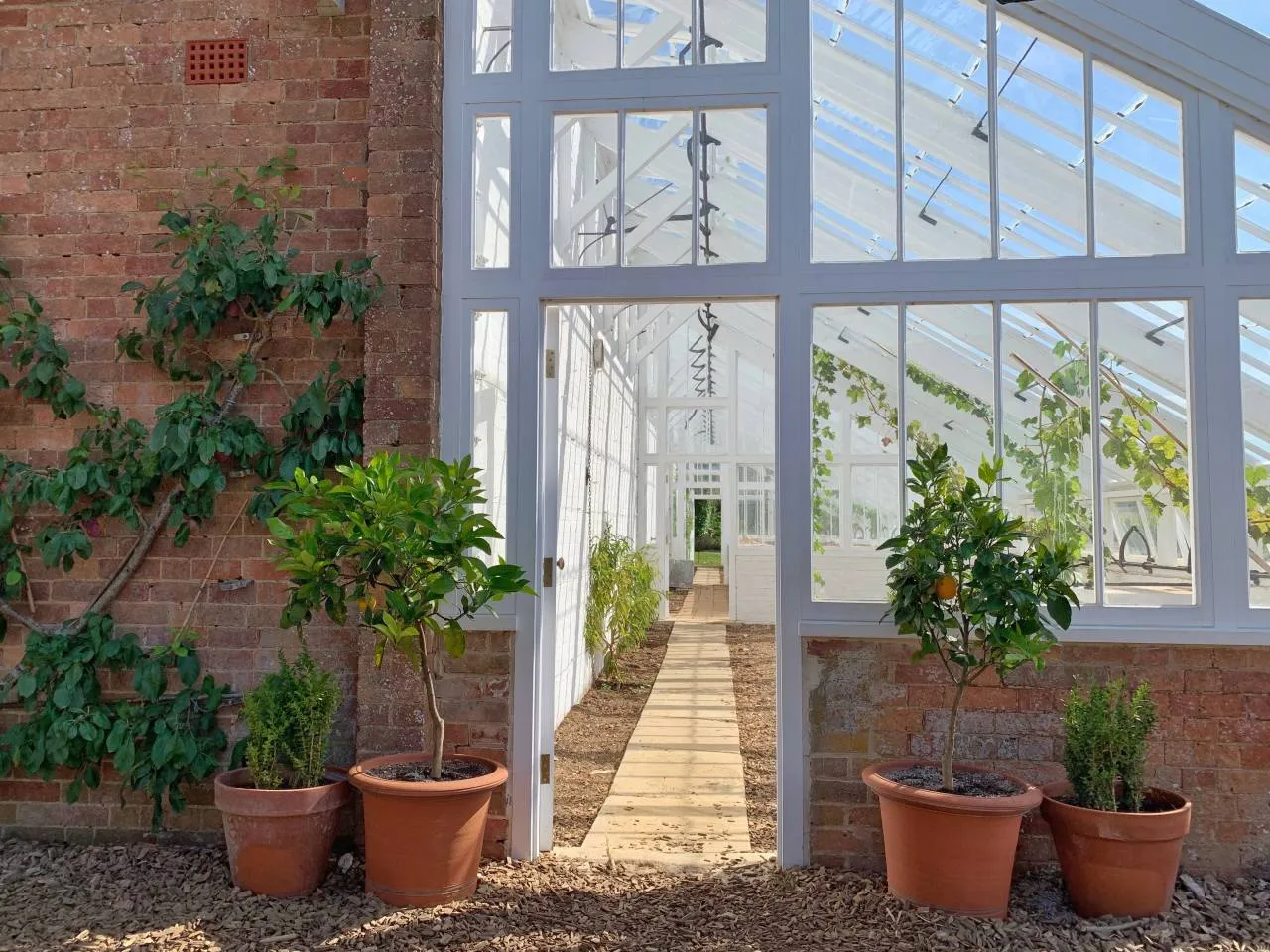Orangeries and conservatories make gorgeous additions to a home; sun drenched rooms that can be enjoyed throughout the year, and a great way of adding value to a property, too. Most people are familiar with a conservatory and what it looks like, but what is an orangery, and what is the difference between a conservatory and an orangery?
Both are predominantly glass-based rooms built to adjoin the main home, but there are a few differences worth considering. In this article, we explain the differences between orangeries and conservatories, and the pros and cons of each, as a quick guide for people considering investing in one of these wonderful structures.
For a quote, or to discuss the matter further, please don’t hesitate to give one of our customer service advisors a call.
What is an orangery?
An orangery is a brick structure with big windows and a flat roof, onto which is built a four-sided glass ‘lantern’. As the name suggests, orangeries were originally designed as large, sunlit rooms in which to grow exotic plants and citrus fruits, and they became popular among English stately homes in the 19th century.
Classic orangeries were built as south-facing structures to maximise sunlight and included substantial windows on the walls and ceiling – but also featured strong brick-built walls and an insulated roof to minimise heat loss overnight. In the days before double-glazing, orangeries were warmer than conservatories and usable throughout the year.
Key features
- Stand-alone structure, or built against the main wall of the house, with a door adjoining the main home, or the modern version which tends to be open plan with the house.
- Multiple tall windows in each wall, comprising up to 50% of the available wall space.
- Flat solid roof with a glass lantern, comprising up to 75% glass.
- Rectangular or square layout.
- Built to match the style of the property.
Advantages
- Orangeries are grand structures that add an air of sophistication and elegance to any home.
- Fully usable rooms that are adaptable to any purpose, including dining rooms, living rooms, play- and games-rooms etc.
- Better heat retention than conservatories, making them more energy efficient and comfortable to use on colder days.
- Less prone to damp and mould than conservatories.
- More secluded and private than a conservatory.
Disadvantages
- More expensive than a conservatory.
- Takes longer to design and construct.
- There are more planning permission and building regulation implications with an orangery construction which take time and cost money
Costs and planning permission
- Orangeries vary in price from £20,000 for small rooms to £100,000 or more for the largest structures, with an average in the range of £25,000 - £50,000, this will be fully fitted including VAT.
- An attractive and well-built orangery may add as much value to your property as a full extension.
- As single-storey structures, some orangeries are covered under permitted development rules and do not require planning permission, but please consult an orangery and conservatory specialist such as Harveys Windows, before undertaking any building work.
What is a conservatory?
A conservatory is a fully glazed room built against the main wall of the property, with usually a low brick wall and base, and a design that maximises the amount of glass and sunlight. Like orangeries, conservatories became popular in the mid-19th century and were initially intended as greenhouses in which to grow plants, and relax in the increased ambient warmth. This is how many homeowners still use their conservatories, as they are perfect sun-traps and provide an ideal environment for house plants, sleeping pets, leisurely lunches, and luxurious coffee breaks! The classic Victorian design was updated in the 1970s to the elegant steep-roofed design used by most conservatories today.
Key features
- A fully glazed building constructed on a low brick base and surrounding wall.
- Walls comprise of 50% + glass.
- Sloping or pitched roof comprising of at least 75% glass.
- Connected to the house through the main wall, with access via French Door, sliding or bifold doors. The conservatory can be open plan with the house but this requires building control approval.
- Range of designs including lean to, P shape, or the distinctive Victorian/Edwardian designs.
Advantages
- A bright, airy structure that captures the maximum available warmth and sunlight.
- All the beauty and warmth of being outside, but sheltered from the rain, wind, and insects.
- More economical to build and easy to maintain.
Disadvantages
- The temperature in conservatories will drop at night and in winter, so it is a good idea to have a stand-alone heating source and good insulation.
- Poor climate control: conservatories can get too hot in summer and too cold in winter unless you fit the latest range of thermally efficient products. Advice should be gathered as to the best specifications to use, in order to get the best use out of your investment.
- The range of off the shelf conservatory designs and layouts is limited, so may not fit in with the style of your house, or your budget. It maybe best to go to a company who design and build bespoke solutions to ensure you get exactly what you are dreaming about.
- Conservatories may be overlooked and lack privacy, depending on their position.
Costs and planning permission
- Conservatories are cheaper than orangeries, starting at around £13,000, up to £40,000 for a more spacious structure.
- A good conservatory can add between 5% - 12% to the value of your property, although to do so, it must be maintained and kept in good condition.
- Conservatories do not usually require planning permission, but it is best to check before investing in a new conservatory.
High quality conservatories and orangeries from Harvey Windows
If you are looking for an attractive, high-quality conservatory or orangery for your home in the Leicestershire area, please get in touch with Harvey’s Windows and Conservatories. We provide a range of beautiful and energy-efficient designs for all types of home that are guaranteed to give you many years of enjoyment. Call us today to find out more.
Image Source: Unsplash


